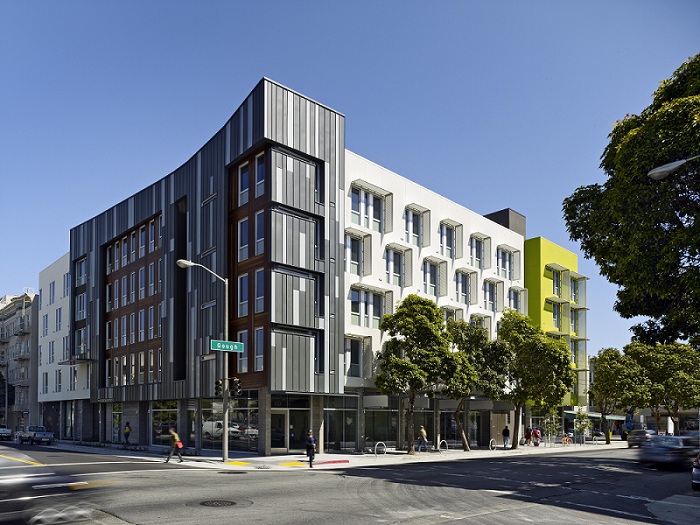Homeless
State Supported Housing Development Will Help Some Homeless but Beyond Reach for Many Oaklanders

Six affordable housing developers have been awarded a total of $30 million to build 413 housing units in Oakland, which will include 168 units of “permanent affordable housing” designed for the homeless and people with disabilities.
However, the other 345 units are classified as “affordable” for “low income households” require incomes from $75,000 to $99,000.
Most of these units are not connected to Project-Based Section 8 vouchers (PBVs) from the Oakland Housing Authority (OHA) that subsidizes the rents and will be beyond the reach of most Oakland residents who live below Highway 580, and earn on the average about $40,000 for a family of four.
The 168 units of permanent supportive housing will be built on a model that combines housing that is affordable to families and individuals experiencing homelessness with supportive services.
Supportive services can include case management, aid for those with physical disabilities, mental health assistance, and support with daily life activities. These units require Oakland Housing Authority Section 8 vouchers (PBVs) subsidies.
The six projects are:
- Fruitvale Studies with 24 units, including 15 units for the homeless, 12 PBVs, plus nine “affordable” units
- Brooklyn Basin (Project 3) with 130 units, 26 for the homeless, 65 PBVs, plus 104 “affordable” units
- Ancora Place with 77 units, 15 for the homeless, 31 PBVs and 62 “affordable” units
- 7th and Campbell with 79 units, 39 for the homeless, persons with disabilities and formerly incarcerated, 39 PBVs, plus 40 “affordable” units
- West Grand & Brush (Phase I) with 59 units, 30 for the homeless, persons with disabilities and vets, 28 PBVs, plus 29 “affordable” units
- Aurora apartments with 44 units, 43 for homeless and persons with special needs, 43 PBVs, plus one “affordable” unit
The six developments, which include a mix of new construction and rehabilitated buildings, are being funded through the State of California’s recently approved Proposition 2 — “No Place Like Home Program” – and the “Supportive Housing Multifamily Housing Program” – funded from Propositions 46 and 1C.
These developments are also funded by voter-approved Measure KK for affordable housing. Project completion date will vary from late 2019 through 2022.
“This is a great example of how city resources can leverage state funds to advance critical projects that will have a significant impact on our communities,” says Maraskeshia Smith, Interim Director of Housing & Community Development.
“These housing developments are incredibly important for addressing the needs of our most vulnerable populations,” noted Sara Bedford, Director of Human Services. “They are part of our overall strategy to address homelessness. Getting more projects like this funded and operational is critical to addressing this regional housing and homeless crisis.”
“However,” said James Vann of the Oakland Tenants Union, “without Oakland Housing Authority vouchers – which are in short supply – the housing will be out of the price range of most Oakland residents. A family of four would have to pay 60 percent of Alameda County Average Median Income (AMI), which would be an annual income of at least $74,340, well beyond Oakland families who earn about $40,000.”
According to the Oakland Housing Authority, currently, there are a total of 2,018 applicants remaining on the Section 8 wait list, which was last opened in 2011, and there are currently 228 voucher holders searching for units. The number of available Section 8 vouchers is limited by available federal funding.
Activism
Oakland Post: Week of November 26 – December 2, 2025
The printed Weekly Edition of the Oakland Post: Week of November 26 – December 2, 2025

To enlarge your view of this issue, use the slider, magnifying glass icon or full page icon in the lower right corner of the browser window.
Activism
Oakland Post: Week of November 19 – 25, 2025
The printed Weekly Edition of the Oakland Post: Week of November 19 – 25, 2025

To enlarge your view of this issue, use the slider, magnifying glass icon or full page icon in the lower right corner of the browser window.
Activism
Oakland Post: Week of November 12 – 18, 2025
The printed Weekly Edition of the Oakland Post: Week of November 12 – 18, 2025

To enlarge your view of this issue, use the slider, magnifying glass icon or full page icon in the lower right corner of the browser window.
-

 Activism3 weeks ago
Activism3 weeks agoOakland Post: Week of November 12 – 18, 2025
-

 Activism3 weeks ago
Activism3 weeks agoIN MEMORIAM: William ‘Bill’ Patterson, 94
-

 Activism3 weeks ago
Activism3 weeks agoHow Charles R. Drew University Navigated More Than $20 Million in Fed Cuts – Still Prioritizing Students and Community Health
-

 Bay Area3 weeks ago
Bay Area3 weeks agoNo Justice in the Justice System
-

 #NNPA BlackPress3 weeks ago
#NNPA BlackPress3 weeks agoThe Perfumed Hand of Hypocrisy: Trump Hosted Former Terror Suspect While America Condemns a Muslim Mayor
-

 #NNPA BlackPress2 weeks ago
#NNPA BlackPress2 weeks agoLewis Hamilton set to start LAST in Saturday Night’s Las Vegas Grand Prix
-

 #NNPA BlackPress2 weeks ago
#NNPA BlackPress2 weeks agoTrump’s Death Threat Rhetoric Sends Nation into Crisis
-

 #NNPA BlackPress4 weeks ago
#NNPA BlackPress4 weeks agoProtecting Pedophiles: The GOP’s Warped Crusade Against Its Own Lies













































